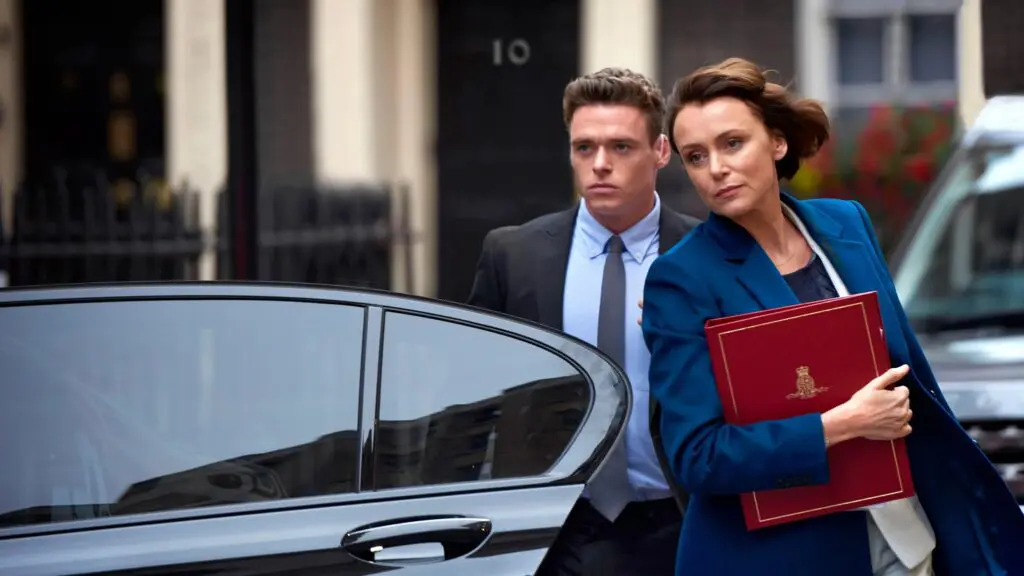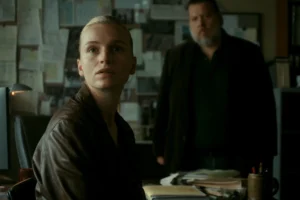Bodyguard took the UK by storm, bringing a story of a scarred war veteran tasked with protecting a controversial politician as her security. Season 1’s plot revolves around the rising conspiracy that the politician is targeted by a terror plot. This is a thrilling series, so to help my readers, I’ve put together a recap, breaking down all the key points of each episode.
Episode 1
Bodyguard Episode 1 debuted with perhaps the most nerve-shreddingly tense scene I’ve seen on-screen. It took up 20 minutes, a third of the episode’s hour-long runtime, but I held my breath for almost all of it. By the time it was over, my chest hurt, and my palms were slick. I felt like I’d been hit by the train that was almost blown to bits by a petrified suicide bomber, played brilliantly by Anjli Mohindra.
That sounds like hyperbole. But as a scene-setter, it had a sense of unpredictability and legitimate dread that is rare on television in general, much less on the BBC. Then again, Bodyguard comes courtesy of Jed Mercurio, whose beloved police procedural Line of Duty took similar risks to award-winning success.
The terrorist’s interlocutor is David Budd, a troubled veteran who is aboard with his two children. Haunted by visions of war, he’s estranged from his wife, Vicky, and in a dangerous close-protection career that he’s mentally unequipped for. But on that train, he’s the only thing that stands between an unwilling martyr and a police marksman, between a train and whatever you’d call several tonnes of shredded, scorching metal. It really is a terrific scene, orchestrated with true panache by director Thomas Vincent.
The following 40 minutes of episode 1 aren’t quite as devastatingly tense, but they’re no less compelling. Budd is swiftly promoted for his heroism to the personal bodyguard of the Home Secretary, Julia Montague, a chilly former barrister who has repeatedly voted in favor of military intervention in Iraq and Afghanistan. The ideological schism is played up here alongside non-too-subtle suggestions that Montague is fostering national mistrust and division to further her own political career; the co-leads are different people with very different views, but they’re united by circumstance, and it’s unclear where that proximity might lead.
And when I say unclear, I really mean it. By the end of episode 1, it’s still not obvious what the show might be about going forward. It could be a romantic tale of political opposites falling for one another – Madden and Hawes, the latter especially, are attractive and charming enough to make this work. But it could just as easily be about a deeply unstable man plotting to kill a high-ranking politician. That both seem equally likely speaks to the strength of the show’s writing.
This is tremendous television – a political thriller that is actually both political and thrilling. I never thought I’d see the day. But after episode 1 you can consider me well and truly hooked; and as mistrustful of National Rail as I always have been.
Episode 2
I must admit that I naively expected a slightly lower-key hour from episode 2, but that’s why you shouldn’t pay too much attention to me. Having said that, though, in the early going, the show exhibited a much more restrained pace than it did in the premiere, taking the time to develop the lead characters in Jed Mercurio’s well-observed and shockingly involving political thriller. Until, within fifteen minutes, it all kicked off again.
This time, it was the interception of a van stuffed with explosives barrelling towards a school that set the stage – a school that, all too conveniently, was attended by David Budd’s children. Whether or not the terrorists knew that in advance – and whether the Home Secretary (Keeley Hawes) knew the attack was coming and allowed it to happen – was part of episode 2’s developing intrigue, with the characters and the audience both still not entirely sure of Julia’s motivations.
And that skilfully developed set piece wasn’t even the showstopper of episode 2, which reserved its most brutal showdown for the midpoint, as Andy, Budd’s facially-scarred old war buddy, targeted Julia with a sniper rifle.
Budd and Julia, both covered in their late driver’s head, had to escape the line of fire in a breathless sequence that was almost as nerve-jangling as the premiere’s opening.
Action of this scale is typically reserved for a season finale, and moments like Andy committing suicide rather than be captured is a hasty climax to the kind of on-going plot that you’d expect to develop over several episodes. But not, apparently, in Bodyguard, which barrels along at an unstoppable pace, with no suggestion yet of where exactly it might end up.
The pulse-pounding assassination attempt did, however, force Budd and Julia into bed together, which wasn’t an altogether unexpected development. But it’s complicated by the Security Service’s suspicion of the Home Secretary, positioning Budd as an inside man now, spying on his ward without her knowledge. It is refreshingly difficult to even speculate where all this might be going.
Episode 3
After finally slowing down for a while, Bodyguard Episode 3 sped right back up, leaving Keeley Hawes’ Home Secretary, Julia Montague, the victim of a suicide bomber. Is she alive? Dead? And did her ostensible protector, David Budd, have anything to do with it? Questions!
Things started well enough. David and Julia continued performing the no-pants-dance at any given opportunity, while in their few moments of separation, the former took to deploying surveillance gear, and the latter swapped illicit security secrets with a smarmy intelligence muckety-muck.
All par for the course in episode 3, which ramped up the ridiculous Westminster wiggling and also made time for a brief Parliament address, complete with jeering from the back benches and a shot of David Madden’s bare arse.
None of this is realistic, but would we want it to be? I’m not sure I’d be up for an hour of tiredly shuffling papers around and being insulted by toy activists on social media, which is contemporary politics in a nutshell, really. Well, that and dancing like you’ve got a limp in both legs. If it’s all the same to you, I’ll take Machiavellian backroom snooping any day of the week.
Speaking of snooping, Julia’s proposed nanny-state legislation isn’t going down too well with the citizenry, who pelt her with eggs and try to blow her up at a college campus where she has chosen to stage her first public appearance since the assassination attempt. I’m not sure that Budd necessarily fulfilled his protection duties in episode 3, but then again, I’m not entirely sure that he cares.
As the net closes around Julia’s would-be assassin and the police discover more information about the disfigured gunman who took pot-shots at her, the implication is that he had an accomplice – and that the accomplice might be David. You can believe it, as well. He’s becoming increasingly strung out with all the pressure, bathroom liaisons, and bloodbaths, and when Julia snuck into his room for a late-night smooch, he got her in a one-handed chokehold like the fucking Undertaker.
Episode 4
In Bodyguard Episode 4, a major cast member was (maybe) killed off, another tried (unsuccessfully) to commit suicide, and the ongoing conspiracy continued to contort itself into unpredictable knots. It was the rare hour of television that seemed to pass by in barely a moment, and now we’re approaching the end of the BBC’s six-part series, it’s impossible to guess where it might end up.
What I certainly didn’t predict was that the show would kill off its female lead halfway through the season, even though that’s a typical Jed Mercurio thing to do. But there you have it. Keeley Hawes’s Home Secretary, Julia Montague, snuffed it as a result of injuries sustained in the campus bombing. Episode 4 didn’t even save that revelation until the end.
Call me cynical, but I’m not buying it until I see a body. Then again, there’s so much going on here that the loss of just one protagonist wouldn’t even seem like much of a loss. It even looked as though we were going to lose the second – and it’s probably a testament to Bodyguard’s storytelling quality that, for just a moment, I really believed we did. I mean, David Budd (Richard Madden) did shoot himself in the head. What was I supposed to think?
But there, you see, lies the conspiracy. Someone had broken into David’s apartment, fiddled with his gun, and swapped the rounds for blanks. He got a nasty head wound and a ruptured eardrum out of the ordeal, but he was otherwise unharmed.
And what’s more, his purpose was renewed. Rather than fretting over various post-traumatic anxieties, David spent the latter half of Bodyguard Episode 4 getting balls-deep in the case rather than the Home Secretary.
And what a case it’s turning out to be. The current prime suspect is aide Tahir Mahmood, in no small part because he’s Asian (although nobody has yet stated that out loud.) But what about the Home Secretary’s simpering special advisor, Rob Macdonald, who handed Tahir the suspicious case in the first place? And what about David himself, who inspected the offending item and apparently found nothing inside but Home Office documents? All the suspects were put through the wringer in testy interrogation scenes by nosey SO15 counter-terror cops DCI Deepak Sharma and DS Louise Rayburn.
Episode 4 had no shortage of tense interrogations, let me tell you. Even Nadia turned up again to provide a crucial lead, although admittedly, David led that conversation himself.
All this, and we still seem no closer to the truth. Macdonald was clearly conspiring with Acting Home Secretary Mike Travis, but we don’t exactly know what about just yet. Stephen Hunter-Dunn and Richard Longcross over at MI5 had a “plan” in place, as one presumes the Security Service must, and the Prime Minister himself isn’t above suspicion considering how nakedly Julia threatened his position. It’s all very intriguing, isn’t it? And ridiculous, of course. But at this point, frankly, who cares?
Episode 5
Bodyguard Episode 5 might not have had David Budd (Richard Madden) pulling handbrake turns under sniper fire, but it had twists galore and teed things up perfectly for a finale.
Among the revelations was that the bomb that splattered Home Secretary Julia Montague was not, in fact, located in a briefcase carried on stage by Tahir Mahmood. In reality, it was hidden under the St Matthew’s College stage and triggered by a pressure sensor, which raises all kinds of other questions. How wasn’t it set off accidentally? Why did it just happen to be Tahir’s presence that detonated the device? Could it have been activated remotely?
It’s exhausting, really. Episode 5 was the hydra of taut television – it kept cutting off the head of one conspiracy and replacing it with two more. DCI Deepak Sharma was having a mare with it all, especially when Budd’s increasingly outlandish theories kept turning out to be more and more plausible.
For one thing, Mike Travis and advisor Rob Macdonald were up to something – fearing a leadership bid, they’d sabotaged Julia’s speech with wonky details that’d hopefully discredit her, but they probably didn’t stick a bomb under the stage. So who did
That’s the question, isn’t it? It might have been the Prime Minister, who it turns out is a bit of a dirty dog, and it might have been the Security Service, particularly the sinister Richard Longcross, who has been personally searching every apartment in London, nicking CCTV footage, interrupting Budd’s efforts to look into the case, and informing his wife, Vicky, along with whoever else will listen, about the affair between Julia and her PPO.
There’s even a recording of it, apparently. There isn’t a single establishment in the country that this guy doesn’t have bugged. According to Nadia, it was Longcross who supplied her husband with the suicide vests.
Like I said – it’s exhausting. Are we really to believe that those in charge of protecting our nation from terrorism would assassinate a cabinet member? It doesn’t seem like much of a stretch to me, but then again, I’m a disaffected loner, not unlike Sgt Andrew Apsted, who was finally identified as the sniper who took potshots at the Home Secretary.
Nobody yet, though, has uncovered that he served in Helmand with Budd, or that the pair had at the very least a casual relationship back in London, which seems faintly implausible.
That finale is, obviously, what all this is building towards, and were Bodyguard a lesser show, I’d insist that there’s too much going on here to wrap up in a single episode, especially now that Julia’s sacked and sassy PR advisor Chanel Dyson strolled into episode 5 with a link to organized crime, as if things weren’t complicated enough. But I’m confident. Now that Budd has been stripped of his badge and gun and is officially rogue, I think we can trust him to get to the bottom of the matter, even if doing so might cost him more than his career.
Episode 6
There are lots of ways you can criticize Bodyguard. It was certainly a bit ridiculous. There were probably a few too many red herrings. Having the Muslim lady turn out to have been a terrorist all along wasn’t exactly wise, politically speaking, seeing as Britain is as Islamophobic now as it has ever been. All of these things, and more, are true. Here’s what is also true: Bodyguard Episode 6 was masterful television.
That’s all that counts, really. Yes, representation matters, and yes, there are rules to storytelling that shouldn’t be flouted. But no, I still don’t care. And neither did the record-setting millions who tuned into Jed Mercurio’s show each week and tied themselves in knots trying to figure it all out. Nobody guessed it. Everybody was enthralled. And I, for one, am tired of not giving the general public the courtesy of assuming that they can’t distinguish between fiction and reality.
So, you won’t see me docking any points for the late reveal that Nadiya was really a secretive, hate-filled Jihadi bomb-maker. The twist worked, even if it was, even for Bodyguard, a bit of a stretch. Lorraine Craddock being on the take worked too, as did the revelation that this was all the work of Luke Aitkens in an attempt to stop Julia Montague from passing legislation that would hamper organized crime.
While we’re on the subject, I’m thrilled that Julia didn’t come back from the dead and that David Budd didn’t turn out to be a secret assassin. It would have been too easy and unsatisfying to go that route, and I appreciate, too, that Mercurio didn’t plant a bomb under David’s car when he and Vicky reconciled at the end.
Speaking of Vicky, whatever you might think of her phantom fella, she proved herself in episode 6 and became much more than the wife of the hero. She was all of us, really, screaming at the television for the armed officers to just let him speak. Luckily, she was close enough to run to his side. We all need a ride-or-die wife like her.
And we need a mate like DCI Deepak Sharma, even if he spent so long being David’s self-proclaimed nemesis that his sudden turnaround felt a bit convenient. Then again, I felt a lot of convenience in episode 6, including David’s slick plot to ensnare Longcross. But what can you do? A lot of the episode also felt ground-breaking, such as when the stoic, suffering hero visited occupational health, confessed he needed help and broke down in tears. You have to take the rough with the smooth.
So much of Bodyguard was smooth, though, that you can’t help but marvel at the finished product. It has been quite some time since I was so entranced with British telly, and it has been longer since I saw the whole country so united on social media. Only rarely does the internet feel like one big living room. If nothing else, that’s what Bodyguard, for all its flaws, was able to achieve. But, let’s be frank, it was also fucking excellent. Bravo, Jed Mercurio.
And that completes my recap of Bodyguard season 1 – what was your favourite episode of the series? Comment below.




